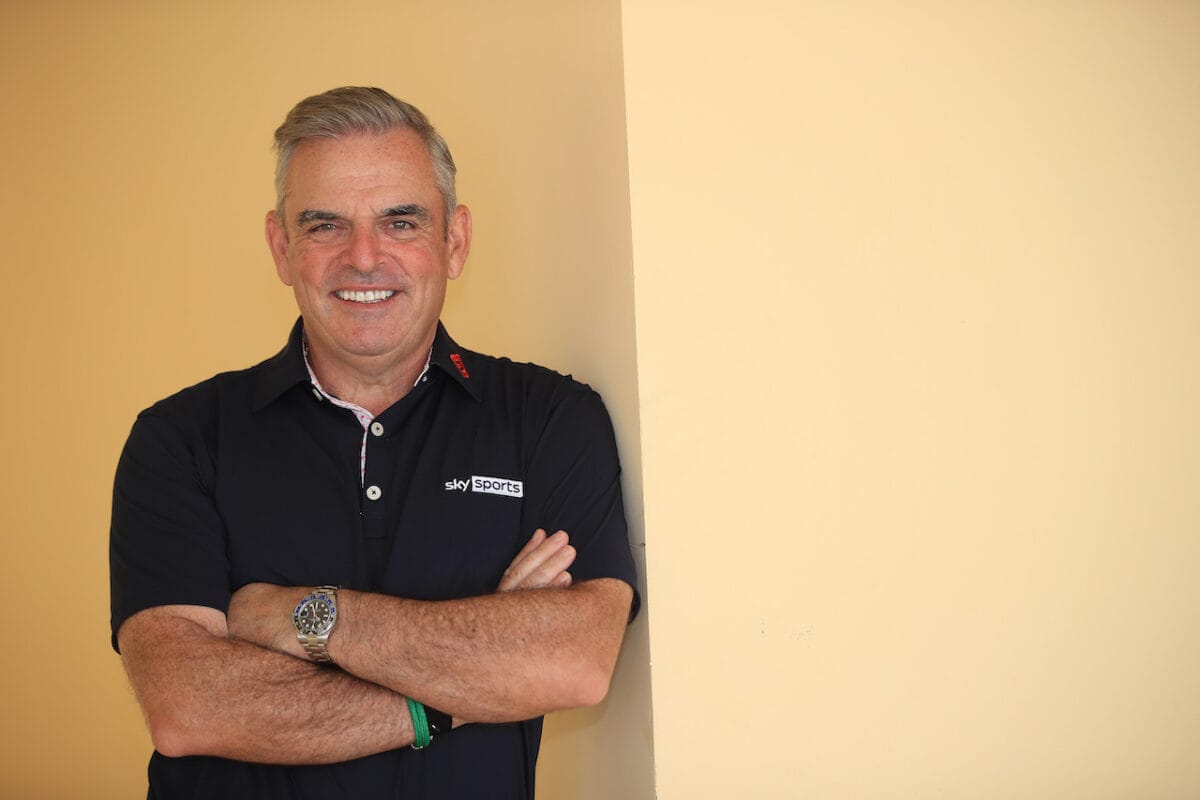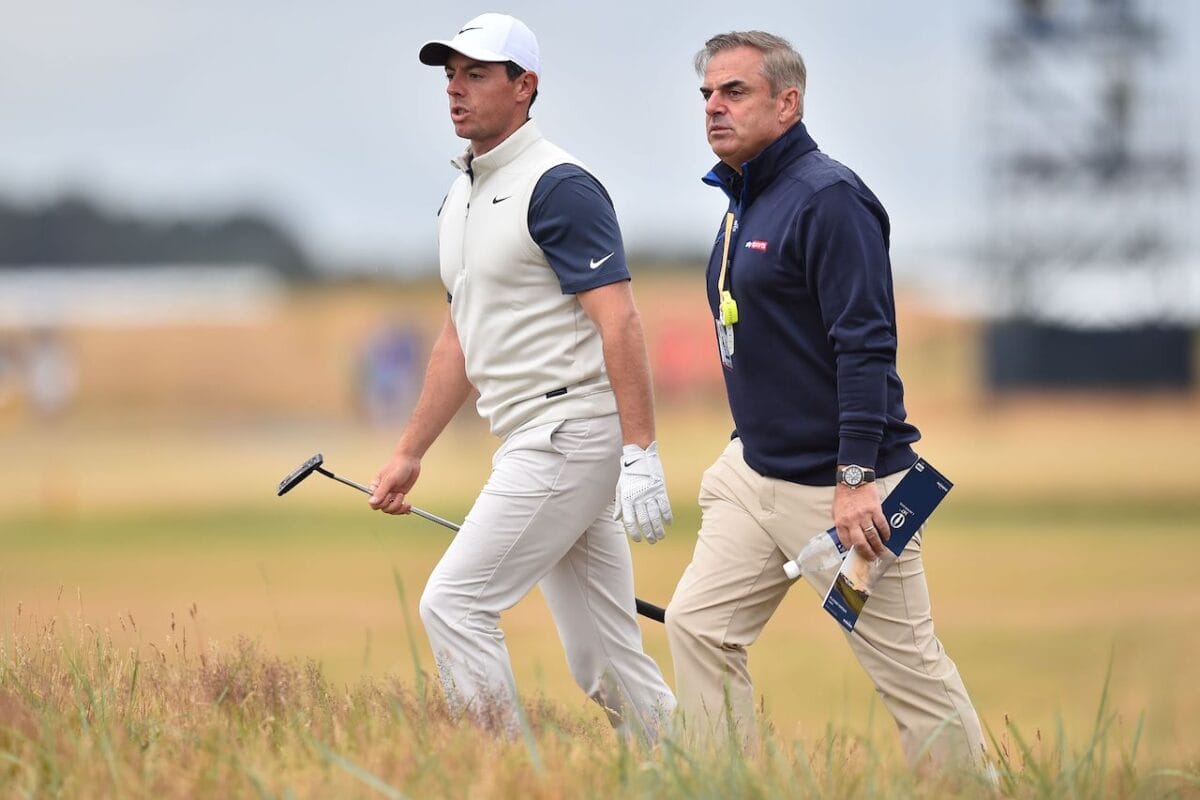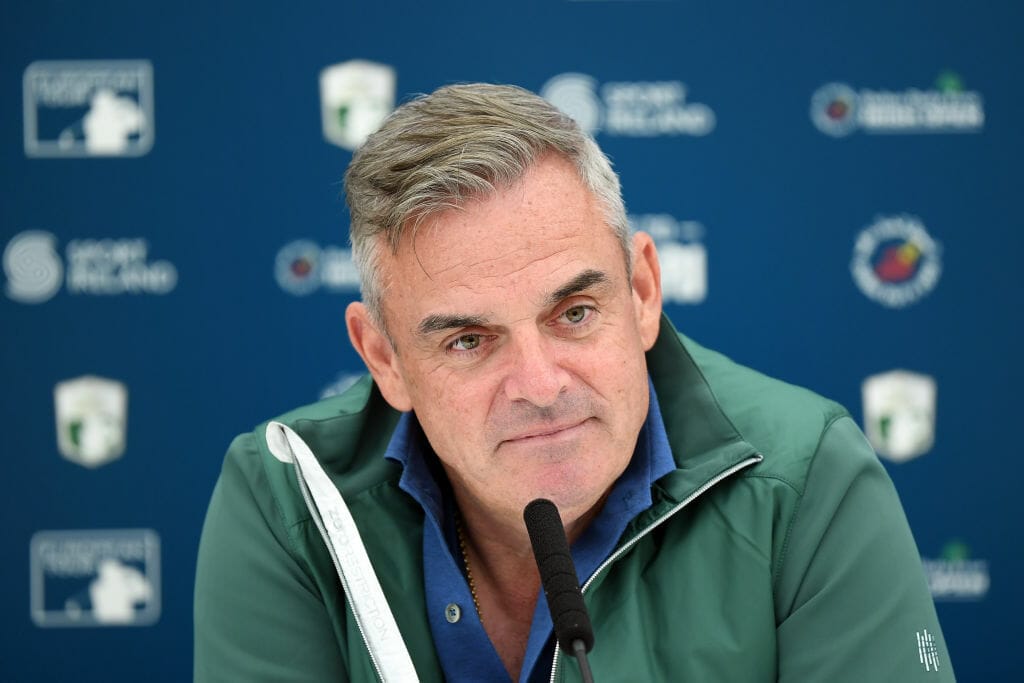At the JP McManus Pro-Am last July, Paul McGinley gathered amongst a plethora of golf’s biggest stars prepared to put rivalries aside, for two days at least, in the name of golf’s most famous fundraiser.
The fairways of Limerick were lined with the main protagonists from golf’s warring worlds, from Woods and McIlroy to Westwood and Poulter, seismic personalities either side of the sport’s dividing line letting bygones be bygones in honour of JP.
Yet while smiles were tuned to mile high levels, tension simmering beneath the surface soon bubbled to the top, and McGinley was caught in the crossfire.
Juggling roles as a Sky Sports analyst and a European Tour board member, McGinley was targeted by a number of LIV players who called his integrity into question. So much so, he felt compelled to make a stand.
“I was questioned directly by a number of LIV players claiming I was compromised because I was on the board and I was also in the media, and I made the decision, ‘OK, that makes my position on the board untenable, so I’ll resign’.
“So that’s what I did, I resigned. And guess what? I still have the same views.”
Fractured. Splintered. Divided. Describe it any way you like but there’s no escaping what’s become a sorry time for men’s professional golf.
The arrival of the Saudi-backed LIV Golf circuit has disrupted the global golf market. Fields have been diluted. Friendships strained. Sides picked.
As for McGinley, he chose loyalty to golf’s existing tours from the outset of LIV’s arrival, bewildered by Europe’s breakaway LIV members who continued to play both sides as they believed was their right. McGinley’s stance has since been vindicated by an arbitration panel ruling in favour of the DP World Tour’s decision to enforce its laws against LIV players who broke contracts to compete elsewhere.
It’s a victory that McGinley believes transcends golf, a case study to empower the governing bodies of all sports to implement regulations and enforce them if members don’t abide by the rules. “It’s an important victory but it’s tinged with sadness because we had to spend several million pounds defending ourselves against our own players,” McGinley says, admitting he has no sympathy for those who defected.
“It was very, very simple in my eyes. You’re leaving to start a rival competitive tour to the one you’re already on, and if you do that, there’ll be repercussions. “They’ve taken four or five events off our schedule already, they’ve taken Valderrama, so why should we now accept them to come back and play our elite events while promoting their own tour, a different tour wearing their hats and uniforms and logoed bags?
“Why can’t we enforce rules to say, ‘guys, you were great when you were part of the DP World Tour, you’re now a competitor of ours and we’re going to treat you as such’.
“End of story.”
While disappointed to see so many long-standing relationships suffer as the fallout continues, McGinley insists he passes no judgement on those who accepted a financial windfall so late in their careers. “I’ve been quoted as saying I would’ve seriously considered it myself if I’d been offered a huge amount of money to go at 45, 46, 47 years of age,” he says.
“Of course I would’ve considered it. I’m not going to say I wouldn’t have done. But I’d like to think I would’ve shown a lot of gratitude to the tours. “I certainly wouldn’t have been part of a lawsuit.”
The former Ryder Cup winning captain highlights the class of Louis Oosthuizen who wrote to Keith Pelley thanking him for the platform the tour had provided the South African; a steppingstone between the Sunshine and PGA Tours that propelled him to eventual Major glory.
The likes of Oosthuizen will be sorely missed. There’s no doubt the presence of decorated champions in DP World Tour fields elevate the product but McGinley refuses to shut the door on any LIV player coming back. The outcome of the hearing, however, crucially means any such appearances will now be on the tour’s terms.
“The ruling puts the tour in a very strong place with a lot of leverage to negotiate,” McGinley says. “If they had lost this court case it would’ve been a free-for-all with players coming back whenever it suited to use us.
“And that’s what’s been happening. We’d 17 or 18 players playing in Wentworth last year, which meant 17 or 18 guys coming off the Challenge Tour didn’t get into Wentworth because it was clogged up by guys playing both sides.
“I don’t think they’ve a right to do that.”
And there-in lies the crux of this great debate. Europe’s LIV contingent claim to be pursuing opportunities much like they have done their whole careers. Independent contractors, many migrated across the Atlantic for the richer pastures of the PGA Tour uninhibited. Now they demand to know why the open door policy has suddenly shut because of LIV.
“People say ‘well the guys played on the PGA Tour so why can’t they play on LIV?’ The PGA Tour never competed in our markets,” McGinley explains.
“The very first LIV event that was ever played was played thirty miles down the road from European Tour Headquarters at Centurion Club, so tell me that’s not an aggressive play?
“The PGA Tour never came over and played a tournament on European soil, ever.
Despite losing a number of its high-profile players to the bottomless pockets of the Saudi-backed tour, Europe’s CEO Keith Pelley has bullishly declared the DP World Tour to be the strongest it’s ever been. It’s an idea that many observers have struggled to accept.
Not McGinley.
“I agree with him,” he says. “Before you make any consideration or judgement on what he said, you’ve got to look at the dynamics that are in play at the moment. And people don’t want to look at the dynamics that are in play at the moment. Things the European Tour has to work around and are important to consider before you look at anything else.
“The first one is that the top players are making so much money now and they’re also playing less tournaments than they ever have before. They still have to play a minimum of four tournaments in Europe outside majors and every one of them has committed to do that… some will play a lot more.
“But the days going back to the 1980s with Seve Ballesteros and Bernhard Langer living in Europe and playing 25 tournaments are long, long gone.
“The second reason is our commercial model. The size of the market in Europe and the size of our TV rights compared to the PGA Tour is a small fraction. “The business model has completely revolutionised in favour of America against the European Tour, and that’s through no fault of the board or the tour. There’s been an explosion in TV rights in America driven by competition among the TV networks.
“They’ve got five or six media powerhouses all negotiating and driving up the price. Over here, we’ve got Sky Sports and we’re lucky to have them because nobody else is interested in paying money for TV rights. Let’s call a spade a spade here.
“Now we’ve got a third player entering professional golf in Saudi/LIV entering the mix. The European Tour has two massive financial titans on both sides of us. If we didn’t act and hitch our wagon, we’d be in serious trouble, so we decided to choose the path of least risk, what we considered an allied friend – the PGA Tour.”
In June 2022, the DP World Tour moved to strengthen its Strategic Alliance with the PGA Tour in a deal that a number of LIV players jumped on, with Richard Bland describing the agreement as nothing short of “awful”, claiming the Korn Ferry Tour was now a stronger option for Europe’s fledgling pros.
The partnership will see the top-10 players on this season’s Race to Dubai – not already exempt – win their PGA Tour cards for the following season; a deal Bland believes will drain the DP World Tour of its talent and significantly weaken its strength of field.
McGinley disagrees.
“The 10th card from the European Tour next year to get straight onto the PGA Tour earns a better category on the PGA Tour than the guy who wins the Korn Ferry, so the evidence is completely contrary to that opinion,” McGinley says, highlighting the Korn Ferry’s $28m total prize fund for 2023, dwarfed by Europe’s $144m pool.
“We’ve already had a record amount of American players apply for the Tour School this year because they see the opportunity now on the DP World Tour.
“We may well have a lot of American players losing their cards in America choosing to go to the DP World Tour rather than going back to the Korn Ferry, and a lot of those will be big names, and a lot of them could be European names too.
“We’re playing for nearly $150m on the European Tour this year, that is a record amount of prize money by quite a ways, and that’s now guaranteed for 13 years going forward, so tell me how we’re a dying tour? There’s more money available than ever before. Let’s look at the facts and make decisions based on them.
“These misty eyed people who think we can go back to the 80’s and the romance of that, expecting the likes of Rory McIlroy to come back and play 25 events on the European Tour the way Seve did. It’s nonsense.
“Why should he come back and play that for a fraction of the money? Our commercial model is tiny compared to the PGA Tour’s. That’s the reality of the commercial world. We’re a commercial tour and we don’t have money falling from heaven.
“We’ve a commercial model based on earnings and revenues, getting sponsorship and putting on tournaments, and we’re doing a pretty good job of that.”
Another myth McGinley is eager to dispel is the idea that the DP World Tour has sold out to the PGA Tour. The DP World Tour proudly announced its extended partnership with America’s tour through to 2035, and while the PGA Tour unveiled several U.S.-centric improvements, elevating prize purses at a number of traditional tour stops, McGinley feels the significant revamps on the DP World Tour have been completely overlooked.
“The misinformation out there is that we sold out to the PGA Tour – we didn’t sell out to the PGA Tour,” McGinley says.
“We sold 40% of our media company to the PGA Tour in return for a huge guarantee for our players for the next 13 years – that’s what we did.
“What people don’t seem to realise is that 50% of European Tour Productions, our media company, was previously owned by IMG under previous boards and Chief Executives. It was 50/50 owned between the European Tour and IMG.
“In 2017, we bought back that 50% from IMG. We drove that business in a very successful manner, and then we decided to sell 40% of that, a good chunk of what we bought back from IMG, to the Americans.
“But we still own 60% of that media company, which is a higher percentage than we owned when IMG were partners with us. So the structure of the Tour and the ownership of our assets is actually in a better position than it ever was before.
“We now own 60% of European Tour Productions along with security for the next 13 years of prize funds in return for aligning with the PGA Tour.
“It was a brilliant deal for the European Tour. A phenomenal deal as The PGA tour now have a huge financial interest in our success going forward and we are already reaping several financial benefits from the strategic alliance.
“We have a new sponsor for the Irish and Scottish Opens, introduced to us by the PGA Tour, as well as two commercial partners introduced to Ryder Cup Europe.
“It was a brilliant deal for the European Tour, our balance sheet already shows that and more importantly than anything else, it provides security for our members going forward.
“The accusation that we sold out to the PGA Tour is completely false and a misrepresentation of facts.”
That hasn’t stopped a number of former European favourites from taking a swipe at the DP World Tour’s new direction, not least Sergio Garcia who declared, “what they are doing is a shame because the European Tour is going to become the fifth [best] in the world”.
“There’s no evidence to support that,” McGinley stresses.
Lee Westwood was another to have a dig, insisting the DP World Tour is nothing but a “feeder tour” to the bright lights of the American Dream.
“I think we’ve always been that in some way, shape or form,” McGinley responds. “Everyone’s afraid of this word ‘feeder tour’. Tell me a player who has not taken the opportunity when they got good enough to go over and play in as many events in America as they could? There’s not one!
“Every player is afraid of this word ‘feeder tour’. We’re the secondary tour and we always have been in world golf.
“It’s connotations that if you use the word ‘feeder’ that’s terrible, that we should be stand-alone. But we’re not stand-alone. We’ve always been secondary to the PGA Tour and nothing has changed in that regard, but at the same time, we have always and will continue to host premier events which will be the stand-out tournaments in the world of golf when they are played.
“All we’ve done is formalise what our players do and work within their desire to migrate to the PGA Tour. Rather than the indirect way of getting there, playing your way into the top-50 and qualifying for world events, we’ve formalised it with direct access via the Race to Dubai.”
Competition breeds evolution and there’s no doubt the arrival of LIV Golf has escalated changes to golf’s status quo at a pace nobody could’ve anticipated.
Yet while the fast-tracked transformation has enhanced golf’s existing tours on both sides of the Atlantic, McGinley concedes that not everything’s perfect, eager for naysayers to take a breath as the powers that be evaluate what’s working and what isn’t.
“Give us a little bit of a break here… we’ve hitched our wagon, we’ve made some very big decisions,” McGinley says.
“Don’t judge us now. Judge us in five years’ time because there’s a lot of things that have to be put in place.
“You know what? Yes, at this moment some of our players are restricted in terms of opportunity to get into Major championships.
“Yes, the World Rankings are unsettled and have lost a lot of credibility with some people as LIV players drop down the rankings.
“And yes, maybe 10 PGA Tour cards is the wrong number but give us time and let us figure that out as we come through this very volatile period in men’s professional golf.
“A lot of decisions have been made in the last 12 months. Some of them will melt and evolve in the right direction, but it’s going to take time, and it’s only going to be a short term wait.”
Patience has been in scarce supply as the debate rumbles on about what’s right and wrong for men’s pro golf. The nature of McGinley’s TV work has placed his head on the chopping block more than most and while accepting his strong opinions will come in for criticism, he can’t stand lively debate spilling into personal abuse online.
“I know everyone’s not going to agree with me and that’s OK. People are entitled to their opinions and we can agree to disagree and I’m good with that,” he says.
“I do that with Brandel Chamblee all the time. We agree to disagree on a lot of subjects, but we go and have a glass of wine together afterwards.
“Nowadays through social media, it has to be black or white. You’re either brilliant or you’re the worst in the world. It can’t be, ‘I like a lot of what he says but there’s some things I don’t really agree with’.
“There’s no middle ground on social media.”
The toxicity seeping into online forums has seen McGinley reduce his Twitter consumption by 80%, as much for self-preservation as anything else:
“I don’t read the comments because I have people who want to criticise me no matter what I say. If I went onto Twitter and said the ‘Our Father’ I’d be criticised because that’s just what they do.
“I don’t want to play that game. I can’t get the mindset of people who go onto Twitter in a social way and be so critical and personal towards anybody, I just don’t get that.
“It’s not just golf. The abuse of anyone in a public forum is just unbelievable. I was reading about the Irish women’s rugby team and a lot of them have come off social media because of the personal abuse they’ve suffered just because they lost a few games.
“It’s unbelievable that people think they have a right to do that just because somebody’s in the public eye. Why can’t they just say, ‘agree to disagree, they’re not my favourite but that’s fine’.
“I know I can’t be all things to all people but don’t get personal.”
When McGinley moved from full-time playing to punditry in 2015, he promised himself one thing – that he would always be honest. Integrity and transparency were of utmost importance. So was straight shooting, even if it meant taking collateral damage along the way.
Eight years on and McGinley has stayed true to his word. He’s no longer on the European Tour board because of it but while he regrets having to step down at such an important juncture for European golf, he walks away completely comfortable with the man staring opposite him in the mirror.
“I enjoyed being on the board and it’s regrettable that I had to come off it,” he says.
“It’s an important time for the board and I’m aware they didn’t want to lose me but I didn’t want to be labelled a mouthpiece for the European Tour when I’m working in the media. I don’t want that accusation levelled at me so I won’t be on the board.
“But you know what? My views are the same.”

The above article is from edition 2023-4 of Irish Golfer and you can view the full digital edition HERE



























Leave a comment